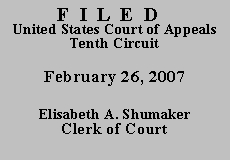

| EMBRY JAY LOFTIS, |
|
| v. | |
| HASKELL HIGGINS, Warden, |
A COA will issue "only if the applicant has made a substantial showing of the denial of a constitutional right." 28 U.S.C. § 2253(c)(2). This standard requires "a demonstration that . . . includes showing that reasonable jurists could debate whether (or, for that matter, agree that) the petition should have been resolved in a different manner or that the issues presented were adequate to deserve encouragement to proceed further." Slack v. McDaniel, 529 U.S. 473, 484 (2000) (internal quotation marks omitted). In other words, the applicant must show that the district court's resolution of the constitutional claim was either "debatable or wrong." Id.
Mr. Loftis raises several ineffective-assistance-of-counsel claims. "A defendant making an ineffective-assistance-of-counsel claim must show both that counsel's performance 'fell below an objective standard of reasonableness' and that 'the deficient performance prejudiced the defense.'" Barkell v. Crouse, 468 F.3d 684, 689 (10th Cir. 2006) (quoting Strickland v. Washington, 466 U.S. 668 (1984)). Mr. Loftis argues that his trial counsel was ineffective because he failed to give an opening statement, failed to object to part of May's testimony, inadequately prepared a defense witness, and gave a defective closing statement. The district court rejected these arguments in a carefully reasoned order, and no reasonable jurist could disagree with its conclusions.
Mr. Loftis's contention that the proof of his prior conviction was insufficient also fails. As the district court found, the proof was sufficient under Oklahoma law and implicates no colorable ground for federal habeas relief. No reasonable jurist could disagree with that analysis.
Finally, Mr. Loftis raises a somewhat garbled claim regarding May's credibility. He may be arguing that May's testimony should have been rejected as incredible, that his attorney inadequately attacked May's testimony, or that the prosecution failed to provide information concerning charges against May and his motive to lie to assist the prosecution. None of these claims has merit. The jury could rationally credit May's testimony, and the questioning of May at trial clearly brought out his problems with the law and his consequent motive to assist the prosecution. No reasonable jurist could dispute the district court's rejection of this claim.
For the foregoing reasons, we DENY Mr. Loftis's application for a COA and DISMISS his appeal. We also DENY Mr. Loftis's motion to reconsider our
order of October 5, 2006, denying appointment of counsel, and we DENY his motion to proceed in forma pauperis.
ENTERED FOR THE COURT
Harris L Hartz
Circuit Judge
*.This order and judgment is not binding precedent except under the doctrines of law of the case, res judicata, and collateral estoppel. It may be cited, however, for its persuasive value consistent with Fed. R. App. P. 32.1 and 10th Cir. R. 32.1.